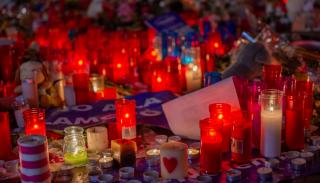
Breadcrumbs navigation
The political use of victimhood: Spanish collective memory of ETA through the war on terror paradigm
Victims have become a topic of scholarly debate in conflict studies, especially regarding the impact of their activism on the evolution and termination of violence. Victims of terrorism are now enlisted within counter-terrorism, given their moral authority as spokespeople for counter-narratives and de-escalation.
Authors Charlotte Heath-Kelly and Laura Fernández de Mosteyrín have published In BISA journal Review of International Studies (RIS), showcasing research that explores how Spanish terrorism victims’ associations have evolved across eras of political violence and how they mediate the translation of international War on Terror discourses into Spanish counter-terrorism. They offer a topography of how the War on Terror has opened a ‘social front’ in Spanish counter-terrorism, with Spanish political elites prominently employing the victims’ associations to this end.
BISA Director, Juliet Dryden, spoke to Charlotte and Laura to find out about ETA, what led to the article and the key takeaways.
BISA members receive access to RIS (and our other journal European Journal of International Security) as a benefit of membership. To gain access log in to your BISA account and scroll down to the 'Membership benefits' section. If you're not yet a member join today.
Full article abstract
DOI: https://doi.org/10.1017/S0260210520000182
Victims have become a topic of scholarly debate in conflict studies, especially regarding the impact of their activism on the evolution and termination of violence. Victims of terrorism are now enlisted within counter-terrorism, given their moral authority as spokespeople for counter-narratives and de-escalation. Our research explores how Spanish terrorism victims’ associations have evolved across eras of political violence and how they mediate the translation of international War on Terror discourses into Spanish counter-terrorism. We offer a topography of how the War on Terror has opened a ‘social front’ in Spanish counter-terrorism, with Spanish political elites prominently employing the victims’ associations to this end. Contemporary terrorism discourses are read back onto the memory of ETA, with victims’ associations assisting the equation of ETA with al-Qaeda and ISIS. Collective memory of the defeat of ETA has also contributed the veneer of ‘lessons learned’ to contemporary counter-terrorism measures. Our research explores the fluidity of terrorism-memory and the importation of global terrorism discourses into Spanish politics, relying upon interviews with key stakeholders in victims’ associations, local politics, and the research director of the new Victims of Terrorism Memorial Centre in Vitoria.


